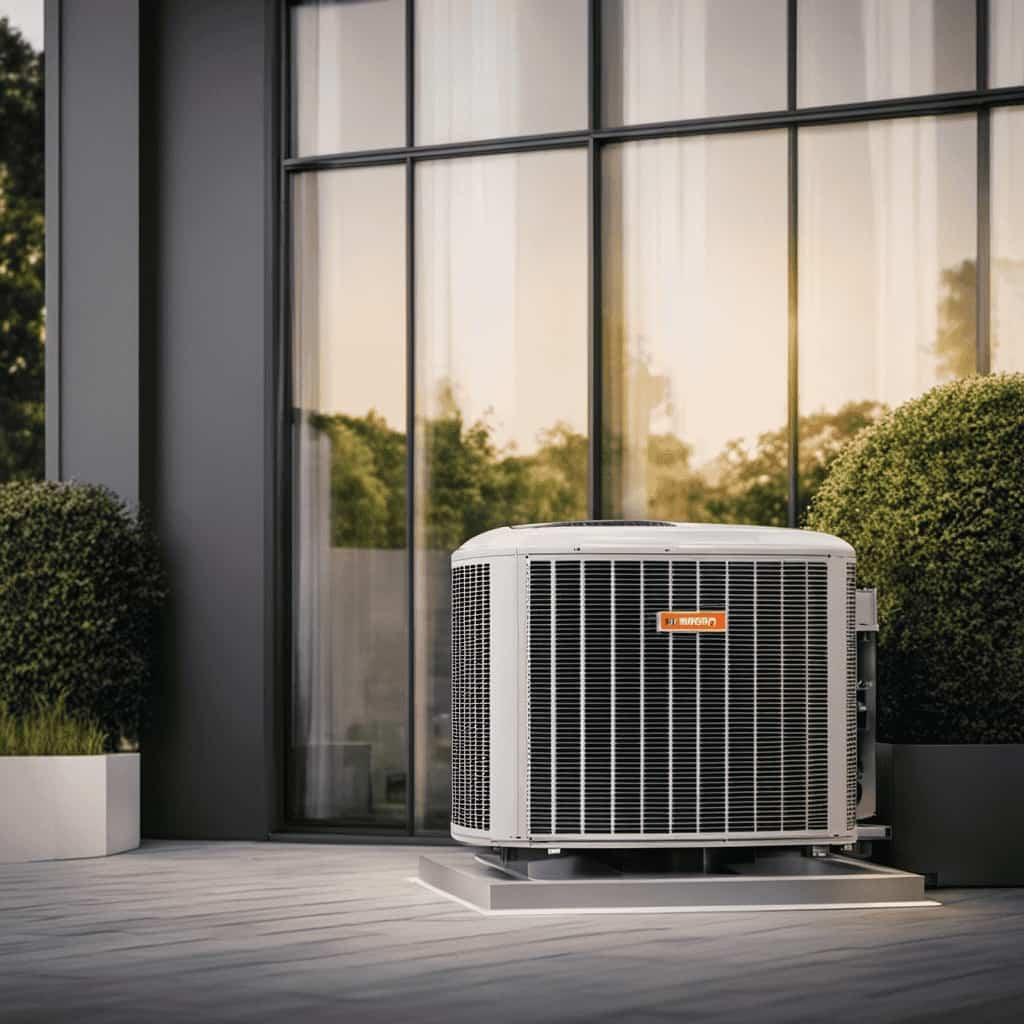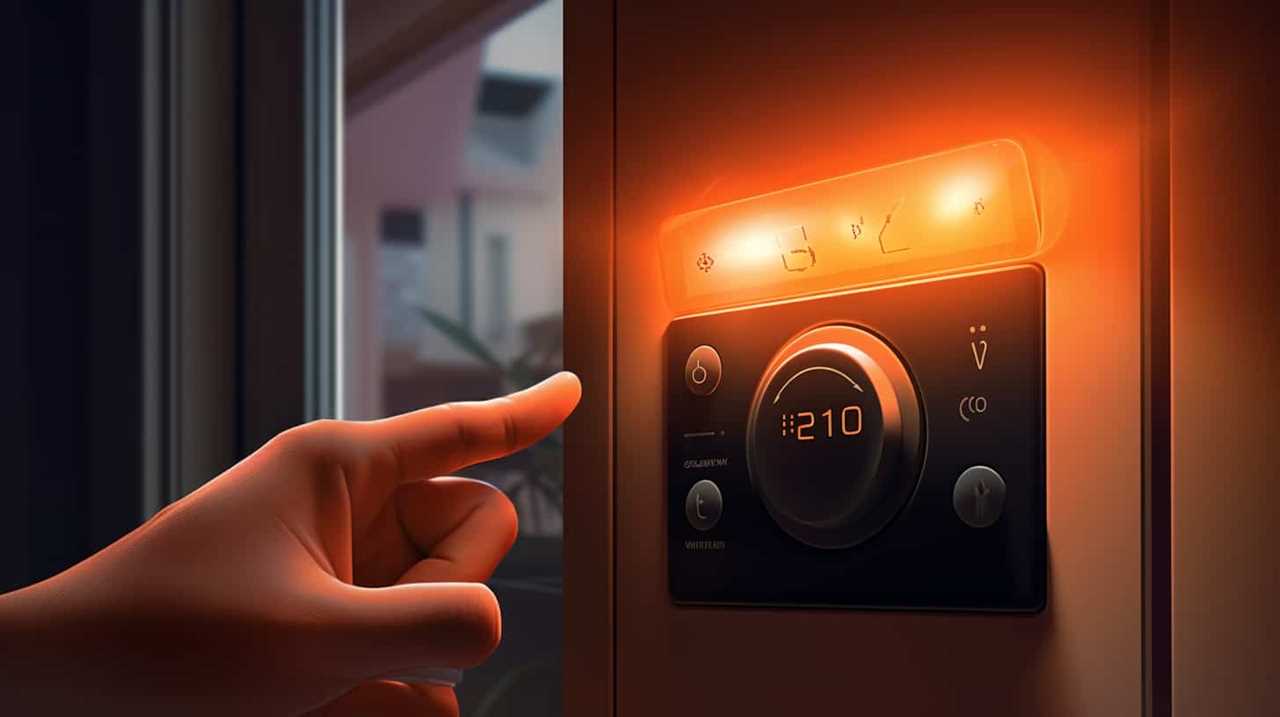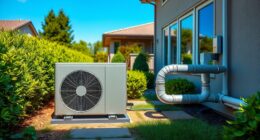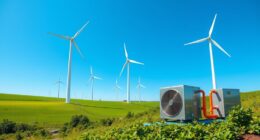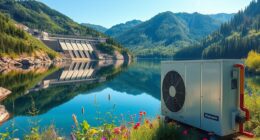Did you know that heat pumps can help you save up to 50% on your energy bills?
In our article about energy-efficient living, we’ll show you how to conserve energy by harnessing the power of heat pumps.
With their advanced technology and practical tips, you can optimize the efficiency of your heat pump and reduce your carbon footprint.
Say goodbye to common misconceptions and hello to a more sustainable lifestyle.
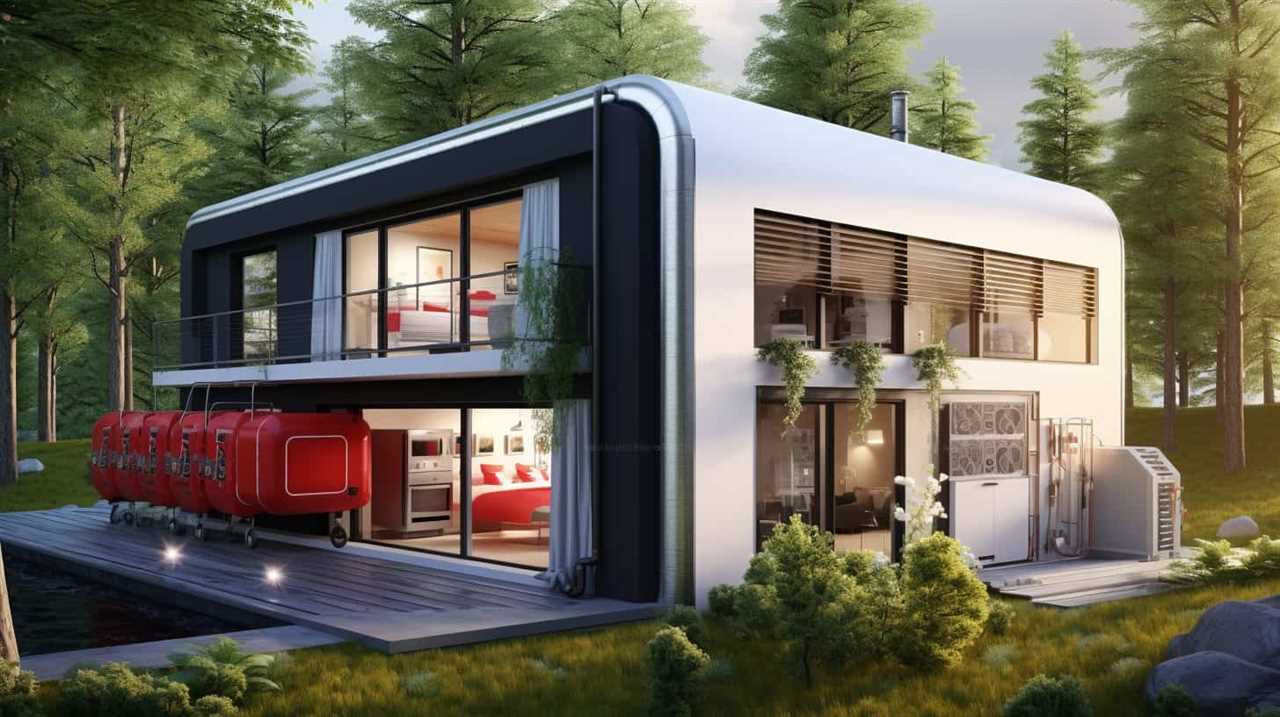
Let’s dive in and start saving energy together!
Key Takeaways
- Heat pumps can save up to 50% on energy bills.
- Heat pumps transfer heat instead of generating it, making them highly efficient.
- Heat pumps require only a small amount of electricity to operate.
- Heat pumps reduce carbon footprint and promote sustainability.
Benefits of Heat Pumps for Energy Efficiency
We love heat pumps because they offer significant benefits for energy efficiency.
Heat pump installation is a smart choice for homeowners looking to reduce their energy consumption and save money on utility bills. Unlike traditional heating and cooling systems, heat pumps work by transferring heat from one area to another, rather than generating heat. This makes them highly efficient, as they only require a small amount of electricity to operate.
Additionally, heat pumps are cost-effective in the long run. While the initial cost of installation may be higher compared to other systems, heat pumps can provide substantial savings over time due to their energy efficiency.
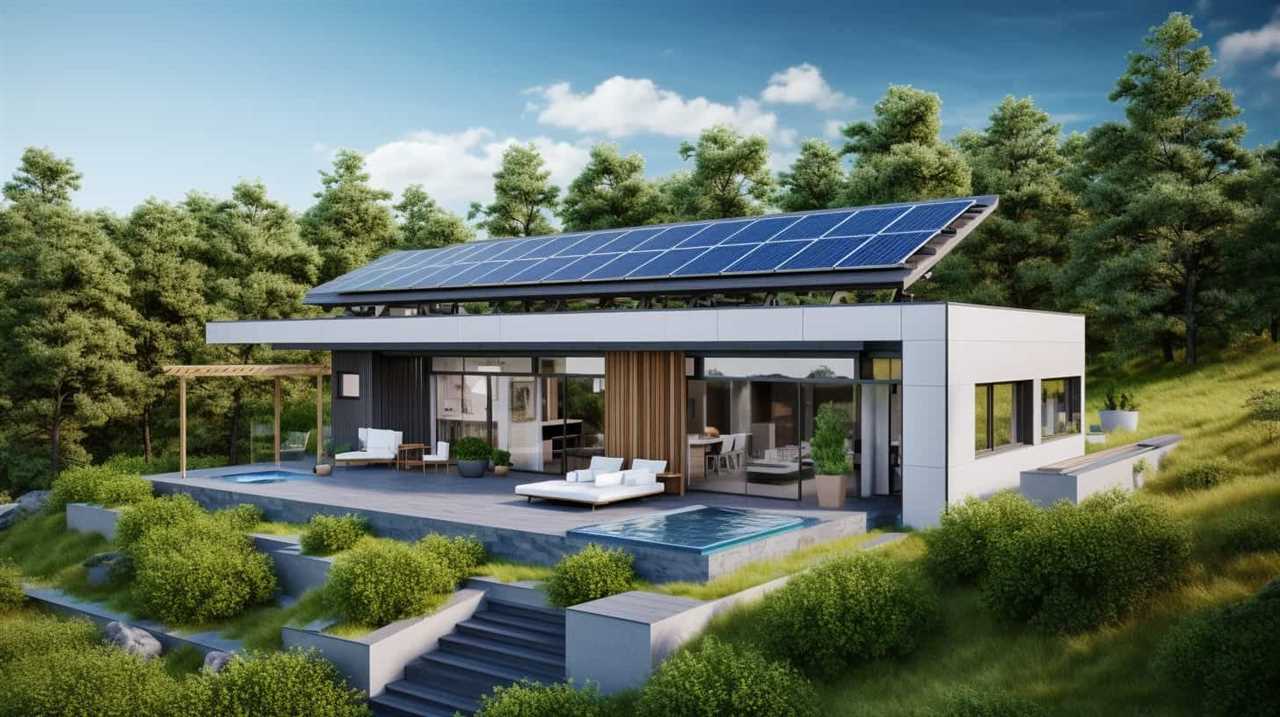
Understanding Heat Pump Technology
Two key components of heat pump technology are the evaporator and the condenser, which work together to transfer heat efficiently. Heat pumps are a cost-effective heating option that utilizes a renewable energy source.
The evaporator absorbs heat from the surrounding environment, such as the air or ground, and converts it into a usable form. This heat is then transferred to the condenser, where it’s released into the desired space.
Heat pumps can provide both heating and cooling functions, making them versatile and suitable for various climates. By harnessing renewable energy sources, such as the heat in the air or ground, heat pumps offer an environmentally friendly alternative to traditional heating systems.
Additionally, they can significantly reduce energy consumption and lower utility bills.

Tips for Optimizing Heat Pump Efficiency
To maximize heat pump efficiency, it’s important to regularly clean and maintain the system. Here are some tips to help you optimize the performance of your heat pump:
-
Keep the outdoor unit clear: Make sure there are no obstructions such as leaves, debris, or shrubs around the outdoor unit. This will ensure proper airflow and prevent any strain on the system.
-
Change air filters regularly: Dirty filters can restrict airflow and reduce the efficiency of your heat pump. Check and replace air filters every one to three months, or as recommended by the manufacturer.
-
Schedule regular maintenance: Professional maintenance is crucial for keeping your heat pump in top shape. Regular inspections and tune-ups can identify and address any issues before they become major problems.
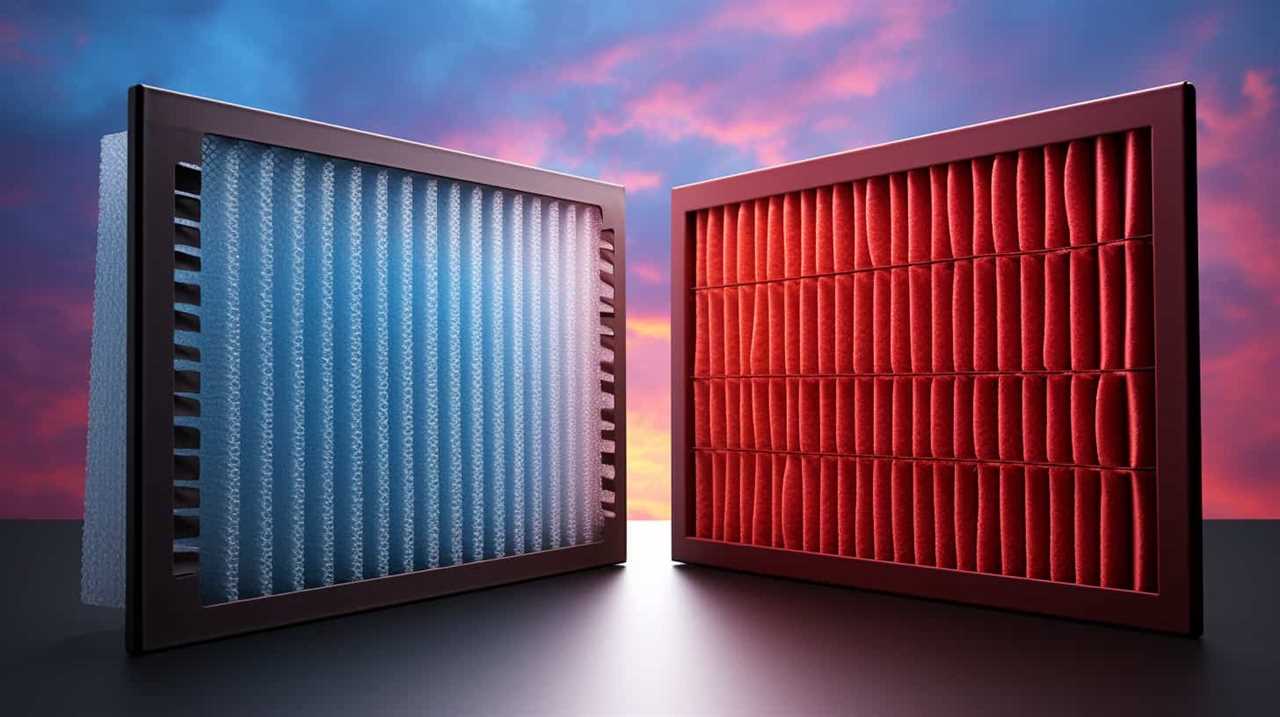
-
Set the right temperature: Avoid drastic temperature changes as it can put unnecessary strain on your heat pump. Instead, set the thermostat to a comfortable and energy-efficient temperature.
Energy-Saving Strategies Using Heat Pumps
Our energy-saving strategies using heat pumps can help reduce electricity consumption and lower utility bills. One of the key factors in maximizing energy efficiency is the proper installation of heat pumps. It’s essential to hire a professional and experienced technician who can ensure that the heat pump is correctly sized and installed. This will optimize its performance and prevent any energy wastage.
Additionally, regular maintenance and cleaning of the heat pump are crucial for its efficient operation. This includes cleaning or replacing filters, checking refrigerant levels, and inspecting the overall system. By following these steps, homeowners can achieve significant cost savings with heat pumps.
Not only will they reduce their energy consumption, but they’ll also enjoy lower utility bills, making heat pumps a practical and economical choice for energy-efficient living.

Common Misconceptions About Heat Pump Efficiency
Let’s address some common misconceptions about heat pump efficiency.
-
Heat pumps aren’t energy-efficient: This is a misconception. Heat pumps are designed to transfer heat from one place to another, rather than generating heat. They can achieve significant energy savings compared to traditional heating systems.
-
Heat pumps only work in warm climates: Another misconception. Heat pumps can work efficiently in both warm and cold climates. They extract heat from the air, ground, or water, and can provide heating and cooling year-round.
By understanding these misconceptions, we can make informed decisions about energy savings and renewable energy sources.

Heat pumps are a practical and efficient way to heat and cool our homes, regardless of the climate. They can help us reduce our carbon footprint and decrease our reliance on non-renewable energy sources.
Frequently Asked Questions
How Do Heat Pumps Compare to Traditional Heating and Cooling Systems in Terms of Energy Efficiency?
Heat pump technology advancements have made them more energy efficient than traditional heating and cooling systems. The advantages of heat pumps include lower energy consumption, reduced greenhouse gas emissions, and cost savings.
Are There Any Specific Maintenance Tasks or Routines That Need to Be Followed to Ensure Optimal Heat Pump Efficiency?
To ensure optimal heat pump efficiency, we follow specific maintenance tasks and routines. These include regular filter cleaning, checking for refrigerant leaks, and scheduling professional tune-ups. Troubleshooting techniques are also employed to address any issues promptly.
Can Heat Pumps Be Used in All Types of Climates, or Are They More Suited for Specific Regions?
Heat pumps are versatile and can be used in various climates. They excel in regions with moderate temperatures, but with proper heat pump installation and maintenance, they can perform well in any climate.
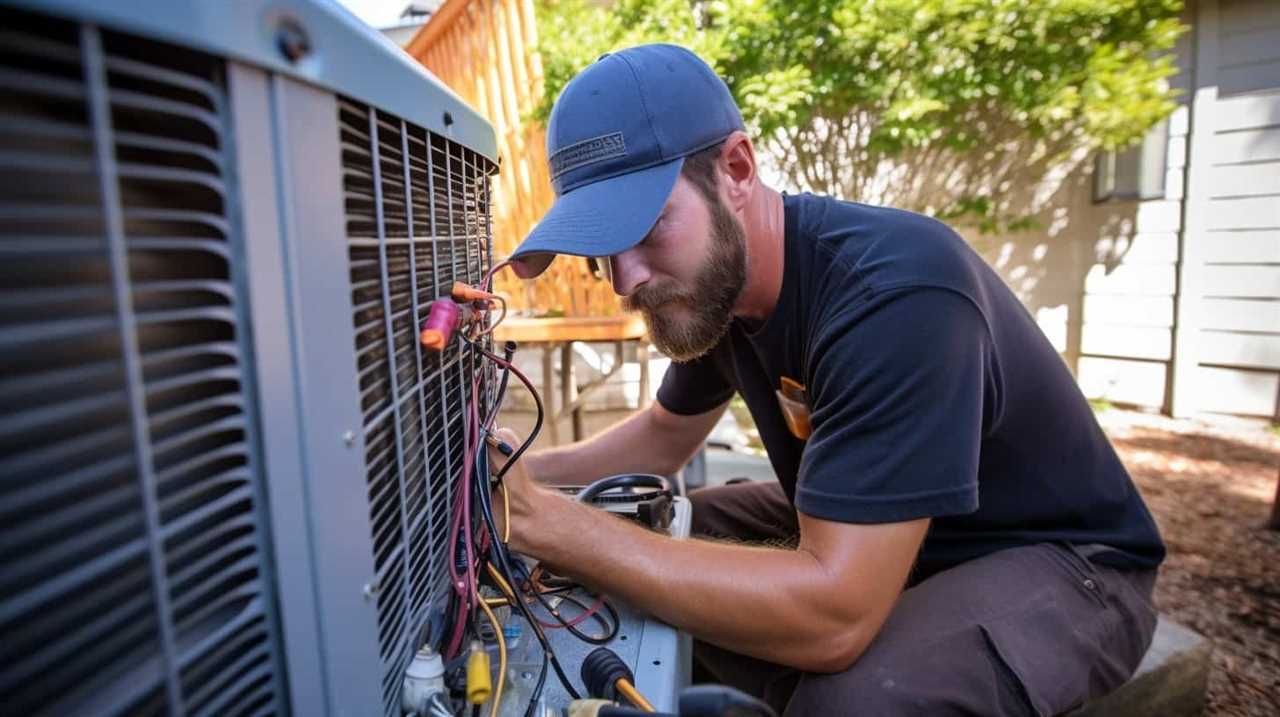
What Are the Typical Cost Savings Associated With Using Heat Pumps for Heating and Cooling?
Cost savings associated with using heat pumps for heating and cooling can be significant. They are highly energy efficient, reducing electricity consumption and lowering utility bills. It is a practical and cost-effective solution for efficient home heating and cooling.
Are There Any Government Incentives or Tax Credits Available for Installing Energy-Efficient Heat Pumps in Residential Homes?
Yes, there are government incentives and tax credits available for installing energy-efficient heat pumps in residential homes. These incentives and credits can help offset the cost and make it more affordable for homeowners.
Conclusion
In conclusion, heat pumps are an energy-efficient solution for reducing energy consumption in our homes. By utilizing the natural heat from the air or ground, heat pumps can provide both heating and cooling with minimal energy usage.
Did you know that heat pumps can achieve an average energy efficiency ratio (EER) of 12? This means that for every unit of energy consumed, heat pumps can produce 12 units of heating or cooling.
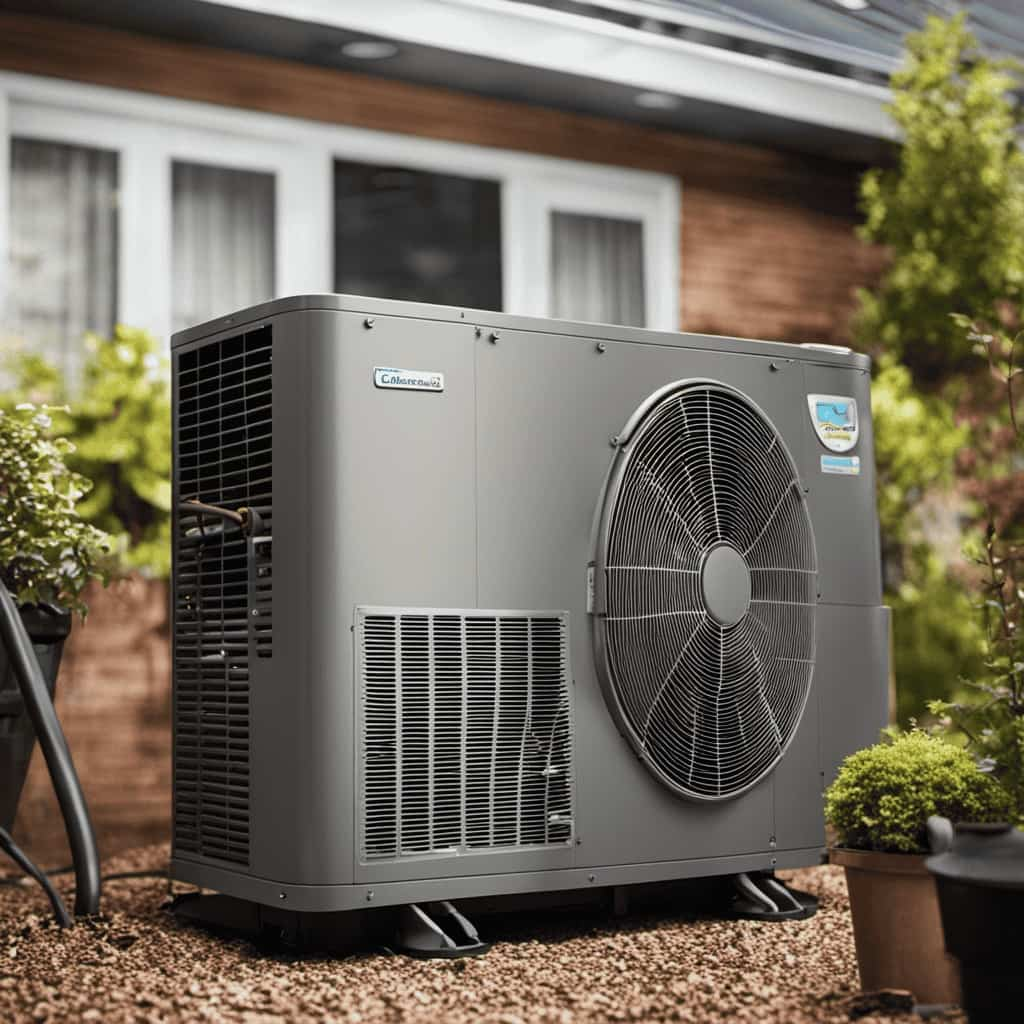
With proper optimization and energy-saving strategies, heat pumps can significantly lower our energy bills and contribute to a greener future.
